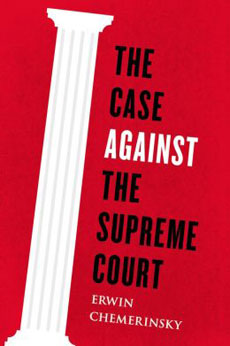When we think about the U.S. Supreme Court, our thoughts often go to dramatic movie scenes like the ones in Separate But Equal, a 1991 TV movie which traced the events leading up to the landmark 1954 Supreme Court decision in Brown v. Board of Education. So much was at stake and it all rested in the heads of nine individuals who could change how the nation functioned. Their bold actions won the admiration of the nation.
But this respectful view is no longer in vogue. In 2001, almost two-thirds of Americans approved of the court's work whereas in 2013 that number had dropped to less than half. Erwin Chemerinsky is the founding dean and distinguished professor of law and the Raymond Pryke Professor of First Amendment law at the University of California, Irvine School of Law. He has been teaching, writing, and litigating about law for more than 30 years.
In the introduction, the author admits that "the Supreme Court is not the institution that I once revered. It has rarely lived up to [our] lofty expectations and far more often has upheld discrimination and even egregious violations of basic liberties." He sets out to prove that this institution "has been on the side of the powerful — government and business — at the expense of individuals whom the Constitution is designed to protect. In times of crisis, when the passions of the moment have led to laws that compromise basic rights, the Court has failed to enforce the Constitution."
This bold work enables us to think more clearly about the Court's decisions which have protected business and state's rights. He shares his evaluations of the Warren Court and the rulings of the John Roberts Court. Best of all, Chemerinsky identifies some changes which might help these nine justices to do a better job in the future.
